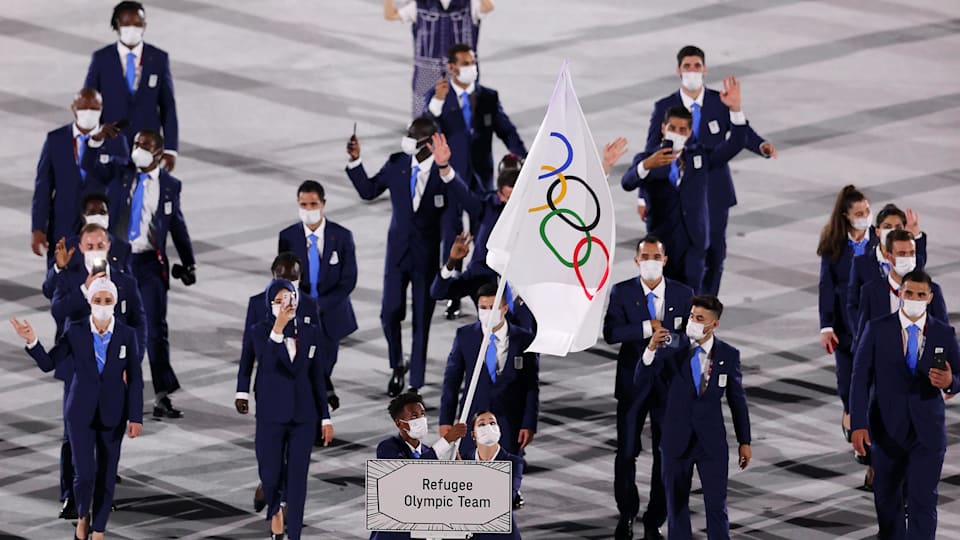The IOC Refugee Olympic Team: a team powered by solidarity
Ten athletes from the IOC Refugee Olympic Team (EOR) started their competitions in Tokyo over the first weekend of the Games, displaying the same determination that has helped them through some of their daunting life challenges.

The first Refugee Olympic Team was created by the IOC for the Olympic Games Rio 2016 in an endeavour to raise awareness of the magnitude of the refugee crisis. For Tokyo 2020, a much larger team of 29 refugee athletes competing in 12 sports will again send a message of hope and solidarity to the over 80 million forcibly displaced people in the world.
“The EOR sends a great signal about what an enrichment refugees are for our Olympic community and for society at large,” said IOC President Thomas Bach. “Watching them compete is a great moment for all of us, and we hope everyone will join. The athletes are welcome in our Olympic community, among their fellow athletes – competing with them but also living with them together under one roof.”
A dedicated programme for refugee athletes
The success of the IOC Refugee Olympic Team at Rio 2016 led to the creation of a dedicated Olympic Solidarity programme entitled “Olympic Scholarships for Refugee Athletes”. The programme offers National Olympic Committees (NOCs) the opportunity to identify refugee athletes living in their countries and support them throughout their training, preparation and participation in high-level competitions. Twenty-one host NOCs are currently assisting Olympic Solidarity as part of this project.
Ahead of the Olympic Games Tokyo 2020, 56 promising refugee athletes from 13 countries benefited from these scholarships, providing them with the financial support that enabled them to train for the Games while continuing their sporting career and building for their future. The grants were extended for a further year following the postponement of Tokyo 2020, bringing the total investment by Olympic Solidarity in support of refugee Olympic scholarship-holders preparing for the Olympic Games to USD 2 million since Rio 2016.
The 29 athletes who make up the IOC Refugee Olympic Team Tokyo 2020 were selected from among these scholarship-holders based on a number of criteria, including, first and foremost, each athlete’s sporting performance and their refugee status as confirmed by the UN Refugee Agency (UNHCR).
Olympic Solidarity: helping athletes around the world achieve their Olympic dream
With Olympic Solidarity, the IOC aims to provide assistance to all NOCs around the world, particularly those with the greatest needs.
Through multi-faceted programmes prioritising athlete development, Tokyo scholarships were allocated to some 1,836 athletes from 186 NOCs in 27 sports. Of these scholarship-holders, 836 athletes from 178 NOCs in 26 sports are competing in Tokyo. Team support grants have also assisted 29 teams from 25 NOCs in 8 sports in reaching the Games.
Highlighting the success of these scholarships in helping athletes achieve their Olympic dream, 143 Tokyo scholarship-holders (63 women and 80 men) were selected as the flagbearers of their NOC at the Opening Ceremony.
In just the first few days of the Games, Olympic scholarship-holders have already won seven gold, four silver and five bronze medals, plus 31 diplomas.
The Olympic Solidarity development and assistance budget for the 2021-2024 plan totals USD 590 million, corresponding to the share of the broadcast rights from the Olympic Games (Tokyo 2020 and Beijing 2022) that belongs to the NOCs. Olympic Solidarity redistributes these funds through programmes offered to all NOCs recognised by the IOC.
Long-term commitment to helping refugees
Further to the success of the Refugee Olympic Team, in September 2017, the IOC launched the Olympic Refuge Foundation as the next chapter in its long-term commitment to supporting the protection, development and empowerment of displaced young people through sport 365 days a year across the globe. The Olympic Refuge Foundation is shaping a movement to ensure young people affected by displacement thrive through sport. Its goal is that one million young people affected by displacement access safe sport by 2024.
Working in cooperation with the Olympic Movement, the United Nations (UN), international organisations, the private sector, non-governmental organisations and other foundations, the Foundation has supported 13 programmes in eight countries (Colombia, Democratic Republic of Congo, Jordan, Kenya, Mexico, Rwanda, Turkey and Uganda) since its launch, with a new programme to be launched soon in France. As a result, 200,000 young people are currently benefiting from sports programmes designed to improve their well-being and social inclusion.
One of the Foundation’s flagship programmes is the nationwide Game Connect programme in Uganda. Delivered by a consortium including NGOs AVSI, Right to Play and Youth Sport Uganda, the Uganda Olympic Committee and UNHCR, the initiative is supporting the mental health of over 10,000 young refugees and their host communities in Adjumani, Palabek, Rwamwanja and Kampala.
Some displaced young people enrolled in the Olympic Refuge Foundation programmes will choose to pursue sport further through their network of clubs and coaches, and some may be awarded an IOC athlete scholarship. For the very top athletes, this could even lead to the ultimate sporting goal, competing at the Olympic Games as part of the Refugee Olympic Team. However, for most young people affected by displacement, the Foundation’s work is about the benefits they can experience through sport that create a strong foundation for life, based on the Olympic values.